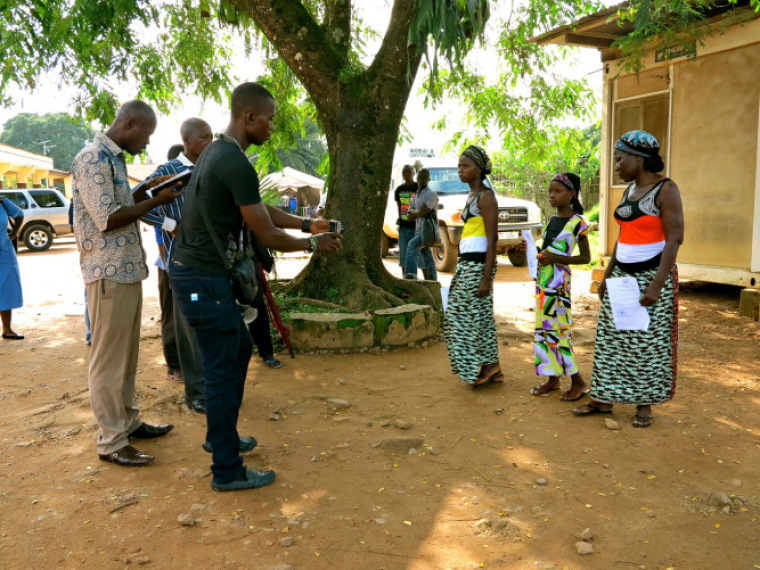Ebola Outbreak 2015 News Update: Traces of Ebola Found in Survivor's Semen, W.H.O. Urges More Caution

The World Health Organization has appealed to Ebola survivors to be more cautious during sexual contact after one survivor found traces of the virus in his semen even after the recommended period of abstinence.
The W.H.O. made the appeal after traces of the virus was found in the semen of an Ebola survivor six months after his recovery.
He was declared Ebola-free in Liberia on September, according to W.H.O. spokesman Tarik Jasarevic.
"He has provided a semen sample which has tested... positive for Ebola, 175 days after his negative blood test," Yahoo! News quoted him as saying.
He said more research is needed before the W.H.O. could give more advice.
"We need to understand better if this particular case is an anomaly or if there really are groups of people who might (carry) parts of the Ebola virus longer," he said.
The recent case caused experts to reconsider their advice, said Dr. Nathalie Broutet, a W.H.O. medical officer.
"The patient is the first we have seen where there is a trace of virus present in semen beyond three months," Broutet told the BBC.
"This made us change our recommendations to go beyond three months," she added.
Those who have recovered from Ebola are advised by the W.H.O. to practice safe sex "until further notice" to avoid passing on the virus to their respective partners, said Bruce Aylward, chief of W.H.O.'s Ebola response.
Studies were already under way, said Aylward, as well as discussions on whether those who have recovered from the virus should be systematically screened after three months to find out their status.
"We should have answers to allow us to give more definitive advice to survivors very, very quickly," he said.
"Even though the sample was positive for fragments of the virus, this does not prove it was passed on sexually," said Broutet. "We need to be very careful and need more clarity about this."
The W.H.O. said in its website on April 4 that although there is no "formal evidence" that Ebola can be passed on to another by sexual contact, "sexual transmission from convalescent patients cannot be ruled out."
Because of this, "men and women who have recovered from EVD should abstain from all types of sex (including anal- and oral sex) for at least three months after onset of symptoms. If sexual abstinence is not possible, male or female condoms offer some protection and condom is recommended to be used correctly and consistently," the W.H.O. statement said.
Survivors are encouraged to use condoms correctly and consistently beyond the original recommendation of three months until more information has been made available.
"Used condoms should be handled with care and disposed safely to prevent contact with seminal fluids. After handling of condoms, hands should be washed with soap and water," the W.H.O. stated.
Over 10,600 people have been killed by the deadliest outbreak of Ebola, which started in late 2013. Most of the casualties were from Liberia, Sierra Leone and Guinea.
 Christians don't have to affirm transgenderism, but they can’t express that view at work: tribunal
Christians don't have to affirm transgenderism, but they can’t express that view at work: tribunal Archaeology discovery: Medieval Christian prayer beads found on Holy Island
Archaeology discovery: Medieval Christian prayer beads found on Holy Island Presbyterian Church in America votes to leave National Association of Evangelicals
Presbyterian Church in America votes to leave National Association of Evangelicals Over 50 killed in 'vile and satanic' attack at Nigerian church on Pentecost Sunday
Over 50 killed in 'vile and satanic' attack at Nigerian church on Pentecost Sunday Ukrainian Orthodox Church severs ties with Moscow over Patriarch Kirill's support for Putin's war
Ukrainian Orthodox Church severs ties with Moscow over Patriarch Kirill's support for Putin's war Islamic State kills 20 Nigerian Christians as revenge for US airstrike
Islamic State kills 20 Nigerian Christians as revenge for US airstrike Man who served 33 years in prison for murder leads inmates to Christ
Man who served 33 years in prison for murder leads inmates to Christ


 Nigerian student beaten to death, body burned over ‘blasphemous’ WhatsApp message
Nigerian student beaten to death, body burned over ‘blasphemous’ WhatsApp message 'A new low': World reacts after Hong Kong arrests 90-year-old Cardinal Joseph Zen
'A new low': World reacts after Hong Kong arrests 90-year-old Cardinal Joseph Zen Iran sentences Christian man to 10 years in prison for hosting house church worship gathering
Iran sentences Christian man to 10 years in prison for hosting house church worship gathering French Guyana: Pastor shot dead, church set on fire after meeting delegation of Evangelicals
French Guyana: Pastor shot dead, church set on fire after meeting delegation of Evangelicals ‘Talking Jesus’ report finds only 6% of UK adults identify as practicing Christians
‘Talking Jesus’ report finds only 6% of UK adults identify as practicing Christians Mission Eurasia ministry center blown up in Ukraine, hundreds of Bibles destroyed: 'God will provide'
Mission Eurasia ministry center blown up in Ukraine, hundreds of Bibles destroyed: 'God will provide' Church holds service for first time after ISIS desecrated it 8 years ago
Church holds service for first time after ISIS desecrated it 8 years ago Burger King apologizes for 'offensive campaign' using Jesus' words at the Last Supper
Burger King apologizes for 'offensive campaign' using Jesus' words at the Last Supper Uganda: Muslims abduct teacher, burn him inside mosque for praying in Christ’s name
Uganda: Muslims abduct teacher, burn him inside mosque for praying in Christ’s name